Recent Fire Damage Posts
Fire Damage from Hair Straighteners and Curlers
3/14/2025 (Permalink)
Fire Damage from Hair Straighteners and Curlers in Your Fayette County Home
Rely on SERVPRO to Restore Your Home after Fire Damage
For many people, a hair straightener or hair curler is an essential daily beauty aid. These devices can, however, pose a fire hazard if they are unattended. If you regularly use one of these items in your home in Fayette County, you should avoid leaving it plugged in when it is not in use, and always ensure you are placing them on a non-flammable surface to avoid combustion. The fire risk that straighteners and curlers pose should not be underestimated, as if left alone even for a short while, small fires can spark and spread, causing additional damage.
Fires from these devices are no less scary than any other fire, and the fire damage they can leave behind in your Fayette County home can be devastating. You may wonder how your home is ever going to look the same, or where to begin. That is where our technicians at SERVPRO come in. We are here to help you after a disaster like this anytime you need us.
When cleaning your home after fire damage, there are four fundamental elements which are required to suspend residues so we can remove them. Temperature is first, as heat increases how fast the chemical reactions in the cleaning products are. We choose the right temperature depending on the solution for cleaning and the material being cleaned.
Agitation is the next step in SERVPRO’s cleaning process. We agitate surfaces by using brushes, towels, water and air pressure, and the sonic vibrations found in ultrasonic machines. Agitation loosens residues from surfaces and spreads the cleaning products over the surface.
The professional cleaning products go through several chemical reactions with surfaces and residues. We choose the right cleaning product depending on what action we desire, like emulsifying, dissolving, oxidizing, bleaching, or changing ph. The amount of dwell time which is needed for professional cleaning and deodorizing products varies depending on the kind of residues and products.
SERVPRO of Fayette County takes the time to thoroughly clean and sanitize anything in your home in Fayette that is salvageable after a fire. Just give us a call as soon as the fire is out so we can help you restore your home.
Tracie "Dusty"Nichols
Who Is At More Of A Risk When There Is A Fire?!
11/8/2024 (Permalink)
More than 43 million Americans have a disability, and unfortunately, they also have a greater risk of starting a fire or getting hurt in one due to: Decreased mobility, health, sight, and hearing that may limit a person's ability to take the quick actions necessary to escape during a fire. Physical limitations. Many actions individuals can take to protect themselves from the dangers of fire may require help from a caretaker, neighbor or outside source. To overcome their unique challenges in emergency situations, disabled ones, along with their caregivers, need to create a safety plan specific to their needs.
Here are eight fire safety tips for people of any disability (physical, auditory, visual, and mental):
Install smoke alarms in every sleeping area and every level of the home. Test the alarms monthly by pressing the test button and replace batteries each year. If you can’t reach the test button, ask someone to test it for you.
For the hearing impaired, install smoke alarms and alert devices made specifically for people who are deaf or hard of hearing. They detect the sound of smoke alarms and flash strobe lights to alert you. Those hard of hearing can also opt for smoke alarms that emit a loud, low-pitched sound alert. Additionally, use vibrating pillows and a bed shaker that wake you up when a fire alarm sounds. Also, keep a telecommunication device for the deaf (TTD) phone in your bedroom close to your bed.
Always be vigilant when cooking. The kitchen is where most fires caused by people with disabilities start. Always supervise the oven or stove when cooking and use a timer. Have a fire extinguisher nearby and be trained on how to use it.
Live on the ground floor. Whether you live in an apartment building or a multi story home, you should arrange to live on the first floor. By doing so, you’ll be able to escape quickly and more easily in case of a fire.
Discuss and practice your fire safety plan with your family, friends, building managers and/or neighbors. Practice your fire escape plan with your service animal if you have one.
Let your local fire department know about your condition and explain your needs. They can perform a home fire safety inspection and suggest escape plan ideas at your request.
If you use a walker or wheelchair, make sure you can easily get through your doorways. If possible, design your home around your disability. Widen the doorways and install exit ramps to make an emergency escape easier.
Always keep a cell phone on or near you to call 911 if a fire or other emergency occurs. Your home is where you should feel safe and secure. But often, danger occurs when we forget to pay attention to the simple things that could easily prevent a disaster. These risks are much more dangerous for people with disabilities, who have special needs and unique challenges in emergency situations. However, with the right planning and preparation, you’ll help keep yourself and loved ones safe when a crisis occurs. And if you do experience fire damage, call SERVPRO of Fayette County immediately to repair your home and make it.
"Like it never even happened."
Tracie "Dusty" Nichols
724-628-3022
Steps To Take To Care For The Victim
9/6/2024 (Permalink)
Fire damage at your business can extend to more than just the property; it can result in injury to your employees. No matter how careful everyone is, an accident will happen at some point. So, make sure your first aid kit is well-stocked for such a situation. The type of burn first aid that’s required depends on the seriousness of the injury.
Take these steps to care for the victim of a major burn until emergency personnel arrive:
1. Protect the Victim Until an ambulance arrives, it’s important to protect the injured person and make sure that they’re away from the source of the burn. If it’s an electrical burn, turn off the power source before going near the victim.
2. Check Victim’s Respiration The injured person needs to be checked for signs of breathing. Begin CPR if you don’t detect breathing. It would be helpful if all employees take a CPR class.
3. Remove Restrictive Items Burned areas will swell quickly. So, if there are any types of restrictive clothing or jewelry in the proximity of the burned areas, remove them.
4. Covering the Area very critical part of burn first aid is covering the injured area. A clean, cool, damp bandage or cloth will help to protect the injury from bacteria and debris from the fire damage until professional help arrives.
5. Don’t Immerse Wound Never immerse severely burned areas in water. This could cause more damage and even hypothermia. Body heat needs to be saved; a blanket should help if there’s a clean one available. A burn this severe shouldn’t be treated with ice, as you might with a minor burn.
6. Elevate Affected Area The burned area should be raised. It should be elevated above heart level until the professionals arrive, if possible.
7. Watch for Symptoms of Shock Beware of the warning signs of shock. Paleness, shallow breathing, and fainting are a few symptoms. A blanket will help to avoid shock.
Tracie "Dusty" Nichols
724-628-3022
How Fires Can Happen
3/8/2024 (Permalink)
Mistakes can happen while cooking, and that’s why being prepared is key. You can protect your home from a kitchen fire, especially young children living in the home, by teaching about kitchen fire safety. Putting safety plans into place is always a great idea. If you can extinguish the fire before it gets out-of-hand, that would be best to limit the amount of damage in your home. Be prepared to think quickly and determine if the fire can be put out without risk of injury or endangering any of your family members. Always put safety first. Smoke inhalation is the number one cause of death in home fires. Not to mention, smoke causes just as much damage to the home as the fire itself. There is a five second rule of thumb that firefighters use. They say that if you cannot extinguish a fire within five seconds then dial 9-1-1 and get out of the house. Make it a priority to review at least once a year what to do in case there is a fire in your home so your family members know exactly what to do. After the fire is put out and everyone is accounted for and safe, you can always count on your friendly neighborhood experts at SERVPRO of Fayette County to help you put your home back together. Here is a list of things to have established in a place of home when it comes to fire safety. These items are ultimately for your safety, and the safety of your family members and family.
Kitchen Appliances Cooking is the leading cause of home fires in the United States. A fire can start from:
- food left unsupervised on a stove or in an oven or microwave
- grease spills
- a dish towel too close to a burner
- a toaster or toaster oven flare-up
- a coffee pot accidentally left on
Tips for using the stove: Always supervise kids while cooking. Turn all pot handles in so they can't be knocked over. Don't wear loose-fitting clothing that could catch fire around the stove.
Cigarettes According to the National Fire Prevention Association (NFPA), cigarettes are the No. 1 cause of fire deaths in the United States and Canada, killing about 1,000 people per year. Most fires start when ashes or butts fall into couches and chairs. If you smoke:
- Be especially careful around upholstered furniture.
- Never smoke in bed.
- Make sure cigarettes are completely out before you toss them into the trash.
Matches and Lighters Playing with matches is still the leading cause of fire-related deaths and injuries for kids younger than 5 years.
- Always keep matches and lighters out of children's reach.
- Store flammable materials such as gasoline, kerosene, and cleaning supplies outside of your home and away from kids.
It's good to practice fire safety with your family. There are also steps you can take to protect your home and prevent fires in your home.
If you’ve experienced fire damage or water damage, SERVPRO of Fayette County is here to help. Our technicians are fully trained in fire remediation, and our 24⁄7 Emergency Line means we’ll be there for you when you call.
Tracie "Dusty" Nichols
724-628-3022
Unpleasant Smells After A Fire
11/10/2023 (Permalink)
Do you know that nasty sting you feel in your nose when walking by a building that has recently burned down? It's unpleasant & hazardous. The odor is sulfur mixed with smoke. It's called Acrid.
What’s the best way to get rid of it?
Smoke contains the residue of all the burned materials and it can be Caustic. Special equipment is used to completely clean the air.
Ozone Machines & Air Scrubbers
Ozone Machines destroy the Molecules, Bacteria, and Spores that cause unpleasant smells.
Air Scrubbers clean the air by repeatedly moving it through HEPA filters which help reduce the smell.
What else is involved?
Other necessary steps involve:
(1) Clean all the hard surfaces
(2) Wash or treat clothes, drapes, carpets, and upholstery. A fire doesn’t always destroy a building, smoke, however, can ruin everything it contacts.
Make sure you do all that’s needed to “clear the air.” SERVPRO® of Fayette County is here to help with all your fire damage needs. We are open 24/7, 365 days a year to help you get back to normal.
Call us at 724-628-3022.
Tracie "Dusty" Nichols
Fire Prevention
9/1/2023 (Permalink)
Your home is your sanctuary. A place where your family spends time together and makes memories. That’s why it is so scary imagining your home getting damaged by an unfortunate fire. Although you can’t control everything that happens in your home, there are some necessary tips you can follow to prevent a possible house fire. Follow these tips below.
- Regularly test your smoke alarms. Test your smoke alarms by pressing the button located on the smoke alarm, if it produces a weak beeping noise, it is time to replace the batteries.
- Check your heating sources. Heating sources that aren’t working properly could potentially trigger a fire. Have them checked annually.
- Maintain a clean oven and stove. Food particles left behind can get too hot on the burner or in the oven causing a potential fire. Make sure nothing is left too close to the stove that could catch fire.
- Never leave your kitchen. Don’t leave your kitchen while cooking. It only takes a few seconds for a fire to break out. If you have to step out of the room, turn the burners off.
- Check your dryer. Make sure to clean out your lint trap after every load of laundry. The build up of lint can cause a fire. Have your dryer inspected by a professional yearly.
- Inspect your cords. Before plugging something in, inspect the cord to make sure it is not frayed or being chewed. Replace the cords as soon as possible if you notice that the wires have been damaged. Avoid running cords under a rug or between the wall and your furniture, it can get too hot causing a fire.
- Store flammable products properly. Store common household cleaners and cosmetic items in a cool area. If they are exposed to high heat, they can combust.
- Use caution with candles. Put candles out before you leave the room or go to sleep and make sure to keep them far away from blankets or any other objects that could catch fire. Place candles on an even surface to prevent them from being knocked over. Also keep them away from pets.
- Use caution with your fireplace. Make sure there is a door between the flames and your flooring, you don’t want any sparks to escape. Allow enough time for the ashes to cool down before throwing them away.
- Always have a fire extinguisher handy. When a fire breaks out, your best line of defense is a fire extinguisher. Make sure every family member knows how to use it properly in case of a fire
Tracie "Dusty" Nichols
724-628-3022
Safety Practices With Children and Fires.
3/10/2023 (Permalink)
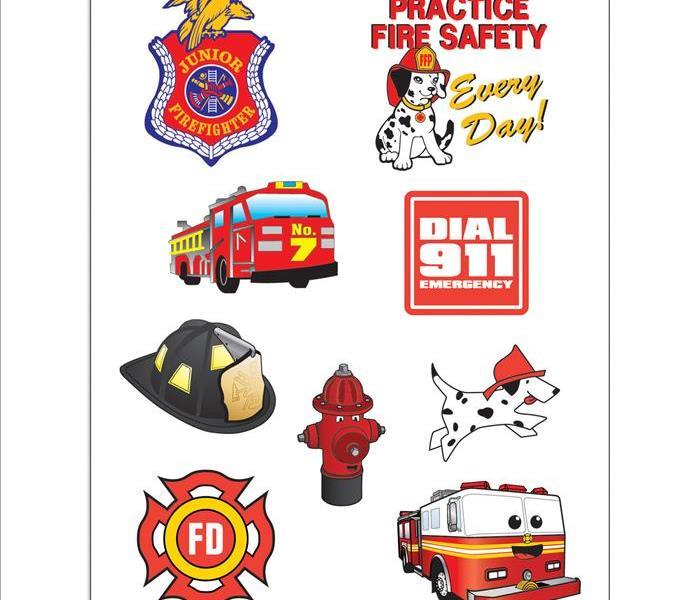 Safety Practices With Children and Fires
Safety Practices With Children and Fires
When it comes to children, you can never prepare enough in the event of a fire. Making sure that children know what to do and what not to do can go a long way in safety.
What a smoke alarm sounds like:
- Some children run and hide when an alarm sounds a house-fire warning. Making and practicing a house fire escape plan helps them respond appropriately to the alarm. What a firefighter looks like at a fire: Show your children with the equipment a firefighter may be wearing and/or carrying. Children may hide instead of responding to their calls.
Escape routes:
- Always teach children two ways out of every room (i.e., window and door). Stay low during escape: Crawl as close to the floor as possible under smoke to a safe exit. Test the safety of their exit route: Use the back of the hand to test if a closed door is hot. If it is hot, use another way out.
Where to meet after escape:
- Everyone must meet at a previously designated meeting place outside the home so that firefighters know that all persons are out of the house. How to call for help: Call 911 from a neighbor's home.
Stay out:
- Never go back inside a burning home to get anything such as toys, clothes or pets These tips are a great way to ensure your children are prepared in the event you have a house fire.
Tracie "Dusty" Nichols
724-628-3022
Disposing Items After A Fire
11/4/2022 (Permalink)
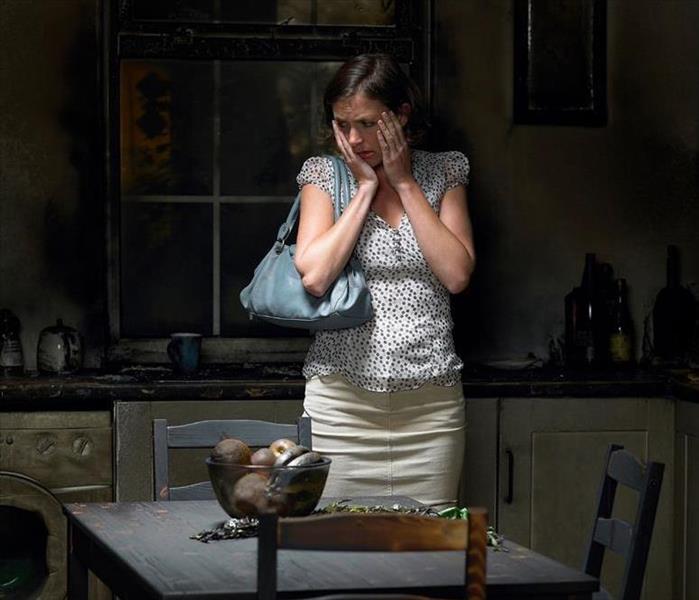 Disposing Items After A Fire
Disposing Items After A Fire
Items to Throw Away After a House Fire Exposure to heat and smoke can ruin delicate or perishable contents. While some items can be cleaned and restored, others should be disposed of and replaced. Here are five items to throw away after a house fire in Fayette County.
1. Food
- Open food packages may become contaminated by smoke, ash, soot, or fire suppressants. It is important to get rid of: Open packages or containers
*Open pet food
*Cans exposed to extreme heat
*Canned or packaged food that was not exposed to high heat may be safe to consume. ~Remove the label, clean the can, and write the contents and expiration date on the can in permanent marker.
2. Porous Kitchen Contents
- Not only food items pose a re-contamination risk. It is also important to dispose of: Plastic cutting boards Plastic dishes, cups, or utensils Baby bottle nipples Plastic is porous and may absorb toxins. Throw away and replace these items after a fire.
3. Medicine
- High heat and smoke can ruin medicine. Examine each product and consider:
*The safe temperature range
*Whether the packaging is open
*Any visible damage
- It is safer to dispose of and replace medicine after a fire. Extremely high temperatures may make any formula less effective.
4. Cosmetics
- Heat can also destabilize beauty and personal care products. Continued use can result in:
*Absorption of toxins through skin
*Discoloration
*Irritation
- You should dispose of and replace products exposed to smoke or high temperatures. Throwing these items out is safer than risking re-contamination.
5. Burned Clothing
- Clothing damaged by smoke or soot may be restored. Burned clothing should be thrown away. This is particularly the case for:
*Charred or singed items
*Babies' or children's clothing
*Burnt linens
- If you are not sure whether clothing can be cleaned, consult with a restoration professional. You should dispose of items with extensive damage.
All of these contents may pose re-contamination risks. If you are not sure whether to throw away or attempt to clean an item, ask fire damage restoration experts in Fayette County.
Tracie "Dusty" Nichols
724-628-3022
Extension Cord Misuse
9/30/2022 (Permalink)
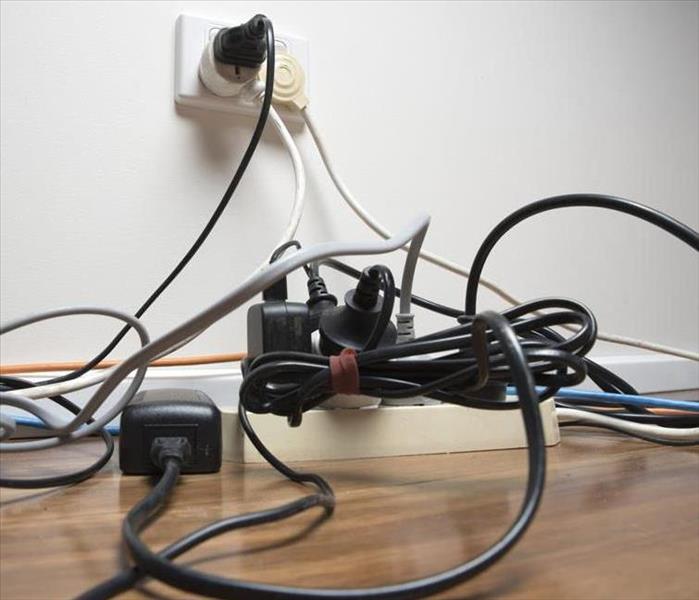 Extension Cord Misuse
Extension Cord Misuse
An extension cord can come in handy from time to time to help you solve a temporary power issue, however they should not be used for a long-term solution. Extension cord misuse can cause damage to your home or business.
According to the Electrical Safety Foundation International (ESFI) here are some tips to keep your extension cords safe:
- Do not overload extension cords or allow them to run through water or snow on the ground.
- Do not substitute extension cords for permanent wiring
- Do not run through walls, doorways, ceilings or floors.
- If the cord is covered, heat cannot escape, which may result in a fire hazard.
- Do not use an extension cord for more than one appliance.
- Make sure the extension cord or temporary power strip you use is rated for the products to be plugged in.
- Never use a cord that feels hot or is damaged in any way.
- Never use three-prong plugs with outlets that only have two slots for the plug. Do not cut off the ground pin to force a fit. This defeats the purpose of a three-prong plug and could lead to an electrical shock.
If you experience fire or smoke damage, please call us! No job is too big or too small.
Tracie "Dusty" Nichols
724-628-3022
Fire Pit Safety.
7/29/2022 (Permalink)
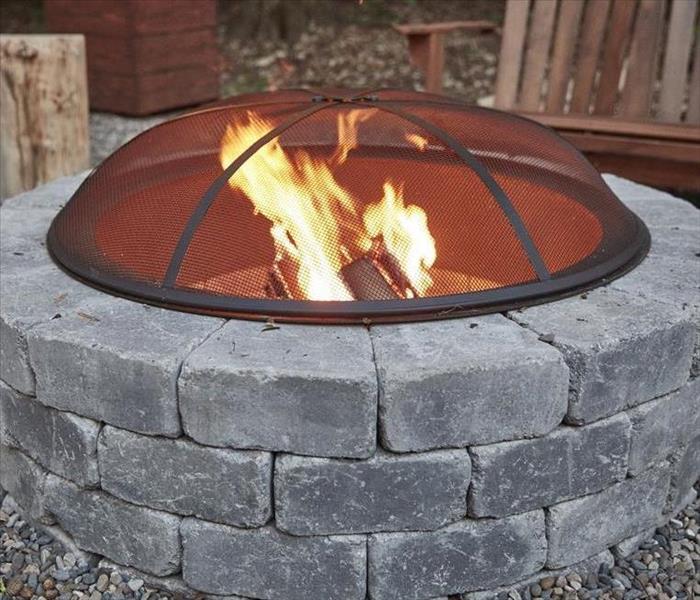 Fire Pit Safety.
Fire Pit Safety.
Fire pits are a great way to accessorize your yard and they are perfect for gatherings! When you use your fire pit, make sure you are keeping you and your property safe by following these safety tips!
Location: Make sure you keep your fire pit AT LEAST 10 feet away from any structures. This may help prevent sparks from hitting your home and excessive smoke from entering your or your neighbor’s home. Do NOT put your fire pit under tree branches or on a covered deck. Make sure your fire pit is in a location where the flames and sparks will not hit any objects.
Under the Pit If your fire pit is not built into the ground, make sure you have stone, brick, gravel, or concrete under the pit. This will help prevent the area below the pit from burning. You should NEVER place your pit over dry grass or over a wooden deck. This is because the heat from the base of its pit may spark a fire to the ground below it.
Weather Do not use your fire pit if it is windy. The wind may push sparks from the fire to an area that is flammable. When you are using your fire pit, you should notice the direction the breeze is blowing. You should move any object out of the way of where the breeze is blowing to help prevent a fire from occurring.
Lighting the Pit When lighting your fire pit, use a commercial fire starter pack. Do NOT use lighter fluid or gasoline to light the pit or to relight fires. You should always keep water nearby just in case the fire inside of the pit spreads. Before you use your fire pit, you should check your town’s laws on fire pits. Some towns require a permit and an inspection.
If the unfortunate happens, call the experts at SERVPRO. We will restore your property and make it look “Like it never even happened.”
Tracie "Dusty" Nichols
724-628-3022
Grill Season
5/27/2022 (Permalink)
Grill season is still in full swing and you know what that means, the possibility for grill fires. Anything from grease fires to hot temps can cause problems when grilling. SERVPRO of Fayette County has some tips to keep your home and family safe this summer!
1. Make sure your grill is at least 6 feet away from any structures. If you are too close to the side of your house or deck this could allow for heat and fire to cause damage to your home.
2. Regularly clean your grill. Always clean your grill after every use and clean out the drip pan. You can use any grill safe cleaner. Effectively cleaning your grill can cause any unwanted flare-ups.
3. Always have an extinguisher on hand. If you don’t have an extinguisher, you can always use baking soda. Always have the baking soda near your station when grilling for a quick response. If you ever have any issues with your grill and your property, call SERVPRO of Fayette County at 724-628-3022
Tracie "Dusty" Nichols
724-628-3022
10 Tips To Help Prevent A House Fire
4/22/2022 (Permalink)
Your home is your sanctuary. A place where your family spends time together and makes memories. That’s why it is so scary imagining your home getting damaged by an unfortunate fire. Although you can’t control everything that happens in your home, there are some necessary tips you can follow to prevent a possible house fire. Follow these tips below.
1. Regularly test your smoke alarms. Test your smoke alarms by pressing the button located on the smoke alarm, if it produces a weak beeping noise, it is time to replace the batteries.
2. Check your heating sources. Heating sources that aren’t working properly could potentially trigger a fire. Have them checked annually.
3. Maintain a clean oven and stove. Food particles left behind can get too hot on the burner or in the oven causing a potential fire. Make sure nothing is left too close to the stove that could catch fire.
4. Never leave your kitchen. Don’t leave your kitchen while cooking. It only takes a few seconds for a fire to break out. If you have to step out of the room, turn the burners off.
5. Check your dryer. Make sure to clean out your lint trap after every load of laundry. The build up of lint can cause a fire. Have your dryer inspected by a professional yearly.
6. Inspect your cords. Before plugging something in, inspect the cord to make sure it is not frayed or being chewed. Replace the cords as soon as possible if you notice that the wires have been damaged. Avoid running cords under a rug or between the wall and your furniture, it can get too hot causing a fire.
7. Store flammable products properly. Store common household cleaners and cosmetic items in a cool area. If they are exposed to high heat, they can combust.
8. Use caution with candles. Put candles out before you leave the room or go to sleep and make sure to keep them far away from blankets or any other objects that could catch fire. Place candles on an even surface to prevent them from being knocked over. Also keep them away from pets.
9. Use caution with your fireplace. Make sure there is a door between the flames and your flooring, you don’t want any sparks to escape. Allow enough time for the ashes to cool down before throwing them away.
10. Always have a fire extinguisher handy. When a fire breaks out, your best line of defense is a fire extinguisher. Make sure every family member knows how to use it properly in case of a fire.
Tracie "Dusty" Nichols
724-628-3022
Precautions Before/ After A Fire With Pets.
3/4/2022 (Permalink)
Fires start and spread quickly, especially with the flammable items that fill our homes. Do you want to be caught in a fire, unprepared? Take a close read of the points below. Go over them a few times because your pet's life may be at stake.
3 Precautions To Take Before A Fire
Ensure your pet's bed isn’t near any items that are highly flammable. Household items like curtains or chemicals are dangerously fast to go up in flames. Keep your pet's bed(s) near easily escapable areas, such as the front or back doors (we know this might sound crazy in day to day)
Place a leash near the front door. When a fire breaks out in your home every second is crucial. By placing their leash near the door you will know exactly where to go in the frantic moments. This saves more confusion when you’re outside, trying to keep your pets close to you.
Train your pet(s) with basic (but vital) commands. It’s vitally important that your pet knows basic commands like “come”. This simple but effective step will also save time when leaving the house. It may also help you avoid having to search for your pet.
3 Simple Steps To Take After The Fire
Place your pet on a leash. Not only will this help them feel secure, but pets commonly try to escape when they feel stressed. Having them on a leash will reduce the risk of them running away, or getting injured outside the house.
Give your pet water. It’s likely your pet will become hot and dehydrated after being around a fire. Make sure they have access to drinking water once you have left the house. This will help stop them from becoming overheated.
Make sure your pet is okay. Look and feel for any burns or injuries. It is recommended that you take your pet to a local vet for a general health assessment as soon as possible.
Tracie "Dusty" Nichols
724-628-3022
Soot Tags
12/8/2021 (Permalink)
As fire damage specialists, we see a lot of fire damaged residential homes and commercial properties. The damage can either be extensive or very minimal.
One of the most common visible instances of fire damage are soot webs, the technical term for them are "Soot Tags". They look exactly like spider webs. Rest assured, you did not have magical "fire spiders" that created these cobwebs in your home.
Soot Tags form in areas of low circulation when petroleum/synthetic based sources burn. During a fire the heat of the fire moves into colder areas since the air seeks to create equilibrium. The soot then rides in the air with the heat particles that follow the air into those colder areas with low circulation and are able to concentrate.
Since that soot is a product of combustion the particles themselves are charged which makes it quite easy for them to create long chains of soot or soot tags. So while it looks like a lot of soot got stuck on pre-existing spider webs it is actually a whole new structure.
If you notice that you have soot tags in your home or business after a recent fire, do not try to clean it up yourself. Any time you try to clean soot without the proper chemicals, tools and experience, you’ll likely cause further damage in your home.
That's why our SERVPRO of Fayette County is here to help, we are the fire damage restoration specialists at your service 24-7!
Tracie "Dusty" Nichols
724-628-3022
Chimney Fires
12/2/2021 (Permalink)
These cold Fayette County nights call for cozying up in front of a crackling fire with a hot drink and fuzzy blanket. But before you light it up, follow these steps to prevent a chimney fire.
- Clean your chimney. You can tell if it’s time to clean it if the smoke is coming out of the stove and not drafting up through the chimney.
- Use dry wood. If the wood is wet or not cured, it will not burn as hot and will smoke more. This can build up creosote in your chimney which can be dangerous.
- Do not overload your wood burning stove with wood. It can either burn too hot or get too much oxygen. This can cause the metal to warp or weaken.
- Schedule an annual chimney inspection. Sometimes we can't see damage so an inspector can find out if there is a problem and fix it, removing creosote, debris, critters or nests. Install a chimney cap. This prevents debris and critters from getting in. It also prevents "back puffing" which is escaped smoke reentering the chimney and then your home.
If you have any questions give us a call!
Tracie "Dusty" Nichols
724-628-3022
Tips for Being Safe with Space Heaters
11/10/2021 (Permalink)
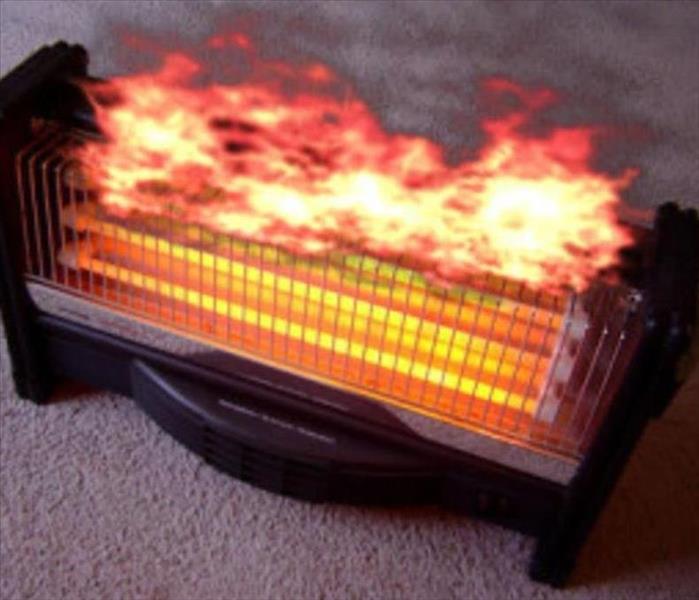 Tips for Being Safe with Space Heaters
Tips for Being Safe with Space Heaters
When the weather gets colder, some people use space heaters to help them stay warm. SERVPRO of Fayette County has some tips for being safe with space heaters. They can cause fires and fire damage when they are not used properly.
When setting up a space heater, remember to keep it at least 36 inches from any flammable or combustible materials and place it on the floor. The heater should be free of flammable liquids. Also do not put them on any easily ignitable or combustible surfaces, such as rugs or carpets, or use them to dry wet clothing.
Heaters should be monitored when in operation. Please plug the heater directly into a wall receptacle, never plug it into an extension cord. When you are using a fuel-fired space heater in an enclosed area, it is a good idea to leave a window or door partially open to allow for fresh air to enter to prevent carbon monoxide (CO) buildup.
We suggest not using space heaters in wet areas like bathrooms or kitchens. Electric heaters should be kept out of wet or moist places as water could lead to a fire or shock hazard. We also recommend keeping space heaters away from exit ways, walkways, and main paths of travel. When buying a heater make sure the heater you purchase carries a label from either UL, ETL, or CSA. These are safety consulting and certification companies. Another big thing is not to use portable space heaters if small children are expected in the area.
You need to clean your space heater regularly, and follow your manufacturer’s guide for specific advice on maintenance and inspection. You should always unplug the unit when not in use. Lastly, please never leave a space heater on when you go to sleep.
Any questions? Call Us!
Tracie "Dusty" Nichols
724-628-3022
Fire Drills
7/25/2021 (Permalink)
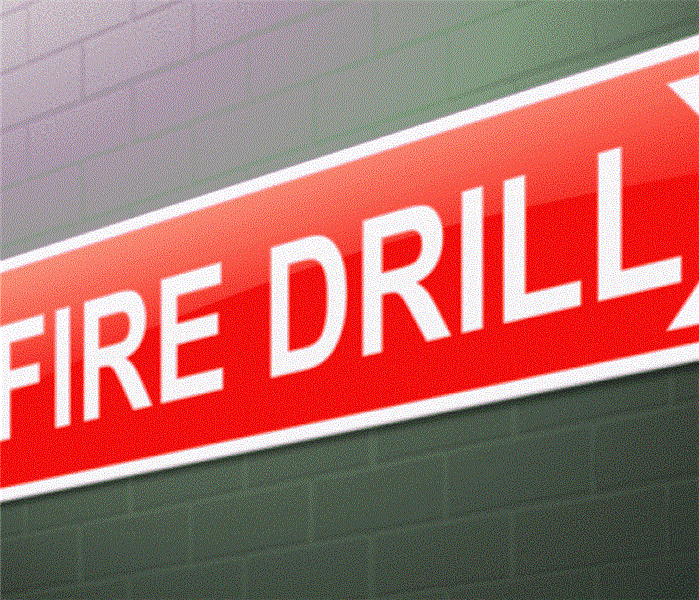 Fire Drills
Fire Drills
Who else used to love fire drill days?!
We all remember those days when fire drills happened in school! Most of us loved them because it was a time to get a small 20-minute break from our classes, unless you had to stand out in the blazing heat or freezing cold, right?!
Well did you know that fire drills are not just for schools, they should be practiced by businesses and even with your families in case of an emergency happening! There is nothing better than being prepared ahead of an emergency. It is crucial to the safety of all that everyone knows more than one way to exit your building or home. Important things to cover are a designated meeting spot (a safe distance from the structure where a headcount can be taken to inform first responders of anyone left in the building), and what to do should you not be able to have an escape route.
Here at SERVPRO of Fayette County, we suggest that you regularly perform a “fire drill” so that the plan is understood and walked through. That your peers or family members know what to do and how to keep themselves and others safe.
If disaster should strike your home or business, know that SERVPRO of Fayette County is ready 24/7, 365. Call us at 724-628-3022 to help walk with you through the cleanup and repairs if an emergency happens in your home or commercial business. Call us!
Tracie "Dusty" Nichols
724-628-3022
Cigarette Fire
4/21/2021 (Permalink)
A cigarette fire in Fayette County or anywhere else could occur, it is preventable by practicing a bit of common sense while indulging in a habit that many find relaxing. Fire cleanup, whether a small convenience or major undertaking, is an activity that no one would find relaxing.
Ways to Avoid Fires from Cigarettes:
It is a fact that smoking indoors is a leading cause of house fires. Before lighting up, consider the following tips to keep yourself and your loved ones safe.
• Smoke outdoors. Homes are filled with flammable materials; an additional benefit to smoking outside is that you can avoid the need to deodorize your home from cigarette smoke.
• Do not smoke while taking medications that increase drowsiness. Avoid alcohol consumption that might also make you less aware of your surroundings.
• Make sure to completely put out your cigarette. Cigarette butts can smolder for hours.
• Never smoke in bed. You are more likely to fall asleep there, and bedrooms are typically filled with combustible materials.
• Empty ashtrays regularly to avoid an ashtray fire.
• Use an ashtray with a wide base or with a weighted bottom to prevent tip overs.
• Do not smoke around medical oxygen tanks. They can explode from exposure to sparks or flames.
• Use water to make sure that cigarettes are completely out before putting butts into trash receptacles.
• Do not leave a lighted cigarette unattended. Pets, children, or even gravity could dislodge it and bring it into contact with flammable material.
• Vaping also poses fire and burn risks because electronic cigarettes can, and have been known to, explode.
All fire personnel know that a cigarette fire is an all-too-common occurrence that can be easily avoided with some foresight. Responsible smoking practices can serve the dual purpose of indulging in a personal pleasure and keeping yourself and others safe.
Tracie "Dusty" Nichols
724-628-3022
Preventing Grease Fires
4/19/2021 (Permalink)
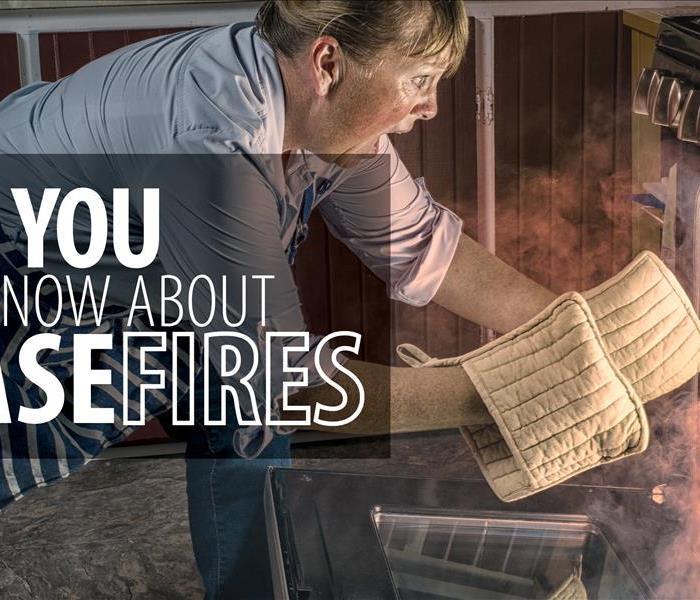 Preventing Grease Fires
Preventing Grease Fires
How to Prevent Grease Fires:
It might surprise you that grease is the common culprit when it comes to initiating the majority of kitchen fires. Grease fires can become uncontrollable in very little time, so it is necessary to prevent them from igniting in your kitchen. Be conscious of safe and dangerous practices alike for cooking with hot oil in order to best protect your home from grease fires.
Safe Practices:
- Be sure to remove any flammable objects from the cooking area before you begin cooking. If a grease fire were to ignite, leaving combustible items, including cookbooks or paper towels, on the cooking surface or even in areas surrounding the surface enhances the risk of the grease fire expanding, as those items would also catch fire.
- While cooking, make sure that you are monitoring the cooking space. Turning your back for even a few seconds can allow for a grease fire to ignite, so it is crucial to be as attentive as possible when cooking with hot oil and grease.
- Also, be sure to save any cocktails that you may be drinking before the meal until after you’ve finished cooking in order to prevent misjudgment or any mistakes from occurring that could cause a grease fire.
- In the event that a grease fire does ignite, however, keep a metal lid as well as some baking soda nearby, as both can be used to smother it. It is important to understand, though, that baking soda should only be used to smother small, isolated grease fires.
Dangerous Practices:
- Throwing food into hot oil would be an example of a dangerous practice when cooking with hot oil. Doing so can cause the hot oil to splash and potentially find its way onto the hot cooking surface, resulting in a grease fire. Instead, be sure to gently place the food into the hot oil.
- This is especially important to remember when cooking with frozen food. Allow those foods to thaw before cooking them in hot oil.
- Finally, refrain from throwing any type of liquid onto a grease fire if one were to break out, as doing so may cause the fire to grow instead of smother.
Any questions, give us a call today!
Tracie "Dusty" Nichols
724-628-3022
Types of Smoke
12/8/2020 (Permalink)
Did you know that there are different types of smoke that can occur? The answer is Yes.
There are different types of smoke that can occur. The main three that occur are Wet, Dry, and Protein.
Wet Smoke works with plastics and rubbers that have low heat, smoldering, pungent odor, sticky, and smeary.
Dry Smoke works with paper and wood that is fast burning, has high temperatures, and the heat rises therefore the smoke rises.
Protein Smoke is produced by evaporation of material rather than from a fire. It is virtually invisible, has discolors paints and varnishes, and also has an extreme pungent odor.
If you have any questions give SERVPRO of Fayette County a call today!
Tracie "Dusty" Nichols
724-628-3022
"Like it never even happened."
Facts about your Christmas Tree and the dangers.
12/2/2020 (Permalink)
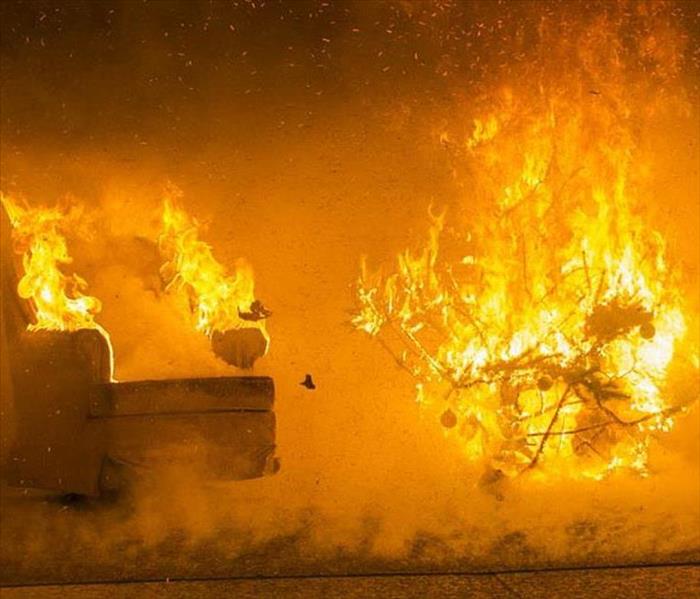 Dangers of Christmas Tree Fires.
Dangers of Christmas Tree Fires.
Fire dangers with you Christmas Tree:
For everyone who has a real live tree for Christmas. SERVPRO of Fayette County wants to inform facts about Christmas tree fires by the National Fire Protection Association.
Here are some Christmas tree fire facts that you and your family should know. With your Christmas Trees, the years between 2013-2017, U.S. fire departments responded to an average 160 home fires that started with Christmas trees per year. The fires have caused an average of three deaths, 15 injuries, and $10 million in direct property damage annually. NFPA stated that on average, one of every 52 reported home fires that began with a Christmas tree resulted in a death, compared to an average of one death per 135 total reported home fires. Here are some three top reasons for Christmas tree fires: Some electrical distribution or lighting equipment like faulty wires or bulbs was involved in 44% of home Christmas tree fires. Reportedly, 25% of the Christmas tree fires, some type of heat source, such as a candle or equipment (space heaters), was too close to the Christmas tree. Lastly reported, that 21% of Christmas tree fires were intentional. Make sure if you are going to burn your Christmas tree, that it is done safely outside away from any structures, trees, or other flammable materials. Some more facts that were reported are that roughly three-quarters of Christmas tree fires occurred in December or January and 39% home Christmas tree fires started in the living room.
SERVPRO of Fayette County hopes no one will have a Christmas tree or holiday fire but if you happen to experience a fire in your home whether it is due to a Christmas tree, holiday décor, or cooking, give us a call at any time!
https://www.nfpa.org/Public-Education/Fire-causes-and-risks/Seasonal-fire-causes/Winter-holidays/Holiday-fires-by-the-numbers
Tracie "Dusty" Nichols
724-628-3022
Emergency Fire Damage Tips
12/2/2020 (Permalink)
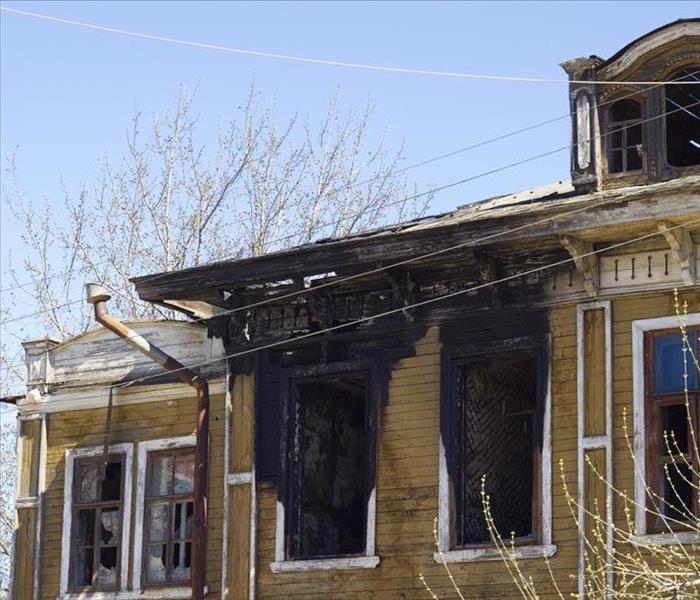 Fire damage after a house fire.
Fire damage after a house fire.
If you experience any fire damage, here are some tips.
Emergency Fire Damage Tips:
- Stop further damage can be used by restricting movement.
-Place towels or linens on more trafficked areas in everything from the fridge/ freezer, and prop open doors to help from soiling.
-When it comes to your chrome items in the kitchen, bathroom faucets, and appliances with lights use a coating of petroleum jelly to help keep your items clean and safe.
-Please do not try to clean or fix painted surfaces and walls. You should contact a SERVPRO Professional.
-Another reason to talk to a SERVPRO Professional is to ask about cleaning carpets and upholstery.
-Do not clean electrical appliances because they could have been way too close to the fire. You should talk to a professional before cleaning.
Call us today!
Tracie "Dusty" Nichols
724-628-3200
Separating and organizing during a fire.
12/2/2020 (Permalink)
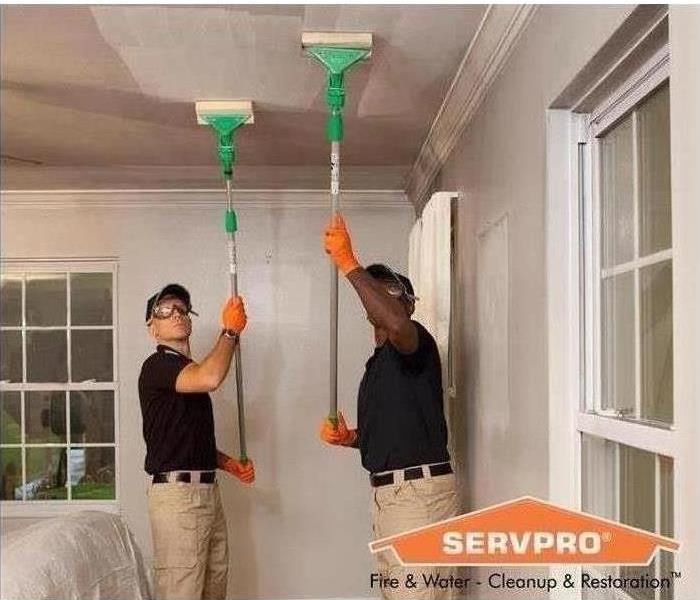 SERVPRO cleaning during fire damage
SERVPRO cleaning during fire damage
During fire cleaning SERVPRO Professionals are specific. In a fire damage, we will separate and organize all items in your home. We will even keep items that were not cleaned completely because as Professionals, we do not throw anything out unless upon the request of the customer. We are very responsible for your household items because they are important to you. When cleaning, we will clean the product to remove every day soiling but if the professionals try with much effort and the soiling does not remove they will be instructed to move on. Everything in your home will be documented. When it comes to personal items such as guns and ammunition, jewelry, valuables and heirlooms, SERVPRO will ask you to relocate items before starting.
"Like it never even happened."
Any questions call, 724-628-3022 and ask for Tracie "Dusty" Nichols.
Fire and Smoke Damage
4/22/2020 (Permalink)
What To Do When You Have Fire & Smoke Damage
DO'S:
- Limit movement in the home to prevent soot particles from being embedding into upholstery and carpet.
- Keep hands clean. Soot on hands can further soil upholstery, walls and woodwork.
- Place dry, colorfast towels or old linens on rugs, upholstery and carpet traffic areas.
- If electricity is off, empty freezer and refrigerator completely and prop doors open to help prevent odor.
- Wipe soot from chrome on kitchen and bathroom faucets, trim and appliances, then protect these surfaces with a light coating of lubricant.
If you find your self in a situation that you or someone you know is dealing with a fire or smoke damage, give SERVPRO a call.
1211 Avon Dr.
Connellsville, PA 15425
Fire & Smoke Damage
4/22/2020 (Permalink)
FIRE AND SMOKE DAMAGE
Tips on what to do when you have a fire or smoke damage.
- If heat is off during winter time, pour RV antifreeze in sinks, toilet bowls, holding tanks and tubs to avoid freezing pipes and fixtures.
- Wash both sides of leaves on house plants.
- Change heating, ventilation, and air conditioning (HVAC) filter, but leave system off until a trained professional can check the system.
- Tape double layers of cheesecloth over air registers to stop particles of soot from getting in or out of the HVAC system.
If you or someone you know has a fire or smoke damage to your home or business, give SERVPRO a call.
"Like it never even happened."
1211 Avon Dr.
Connellsville, PA 15425
724-628-3022
Puff Backs, Soot and Air Ducts
12/27/2019 (Permalink)
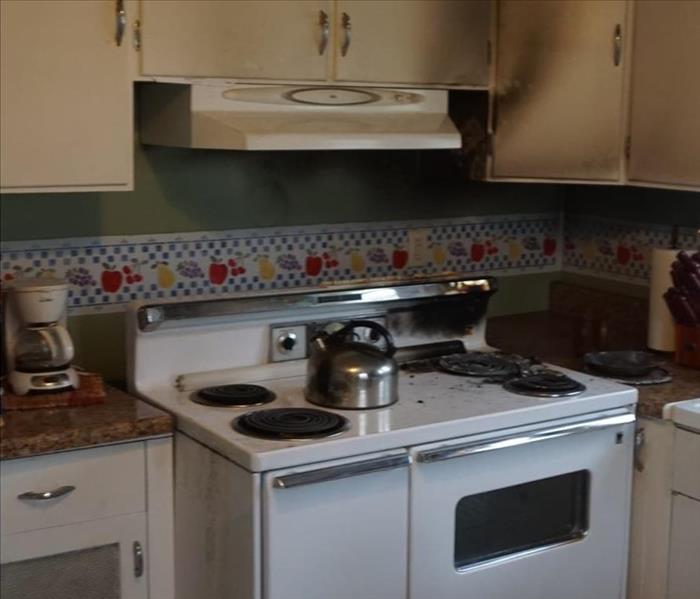 These are the remnants of a stove fire. Above you can see the soot on the wall and vent above the stove top.
These are the remnants of a stove fire. Above you can see the soot on the wall and vent above the stove top.
Most times fires and fire damage dangers extend passed just the actual flame. The flames may destroy most everything in its path, what is left behind and the effects it can cause are equally destructive. It leaves behind a black, chalk-dust like material called soot. Soot can vary in toxicity, color and smell based on what was burned. It can pollute your body if ingested and caused serious lung damaged along with a host of other even worse injury and diseases. This soot left behind by a fire can get onto and stain almost everything in your house or company depending on where the fire is and how well it was contained, even though the smoke and soot is almost impossible to contain due to its state of matter. This means that the smoke can rise and contaminate your air ducts polluting the air the circulates through your home. This can also happen with a furnace in the home when it misfires triggering a puff back. Both of these events contaminates the air and could be potentially fatal to living beings if they're exposed to it for a long time.
Luckily, SERVPRO of Fayette is very well versed when it comes to structure fires and the mediation of all that comes with it. With our extensive duct cleaning, in cases of puff backs and soot infiltrating the duct system, we make sure your air quality is the at its best. We also clean and restore anything that can be recovered from the fire back to its preexisting condition and sometimes better.
Smoke Damage
12/26/2019 (Permalink)
There are fire hazards all throughout a house from faulty electrical outlets to something as little as Christmas lights. These are very dangerous and must be monitored at all times. However, when these calamities do occur, fire isn't the only thing you have to worry about that can cause severe damage. The smoke and soot from the fires actually cause a considerable amount of damage to the house and its belongings as well. This can cause a thick layer of black soot that just coats whatever it comes into contact with and is sometimes extremely tricky to get out of things such as fabrics and off walls. This soot can also get in the vents and duct work of your house or place of business, degrading the air quality within your house and contaminating your lungs. Luckily here at SERVPRO of Fayette, cleaning smoke and soot damage from your ducts, walls, furniture or anything effected is something we take pride in. We'll make it "Like it never even happened."
What To Do Until Help Arrives
12/26/2019 (Permalink)
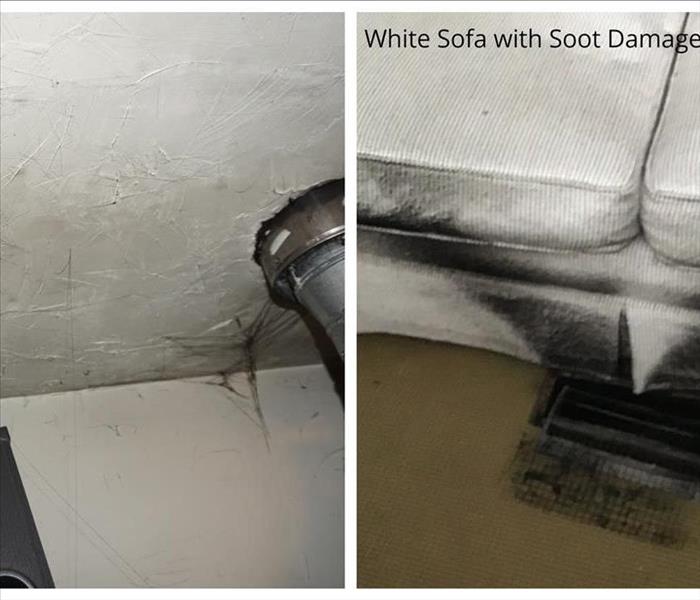 This image just shows soot build up in areas of the house. Soot is toxic and shouldn't be breathed in or it can cause serious health issues.
This image just shows soot build up in areas of the house. Soot is toxic and shouldn't be breathed in or it can cause serious health issues.
It is very important to know what actions to take yourself when catastrophe strikes and you're waiting on your area's SERVPRO crew. In some scenarios, taking action and doing what you can do is the difference between the problem being easily managed and it getting worse. I'm going to list a couple "do's and don't's" when it comes to fire and smoke damage.
One thing that anyone can do in the instance of fire or smoke damage is to limit movement in the home to prevent soot particles from being embedded into upholstery and carpet. Another thing you can do is to tape a double layer of cheesecloth over air registers to stop particles of soot from getting in or out of the HVAC system.
One thing not to do is to attempt to clean any electrical appliances that may have been close to fire, heat or water. Another big thing to keep in mind is to not consume any food or beverages that may have been stored close to fire, heat or water.
Winter House Fire Avoidance Tip
12/23/2019 (Permalink)
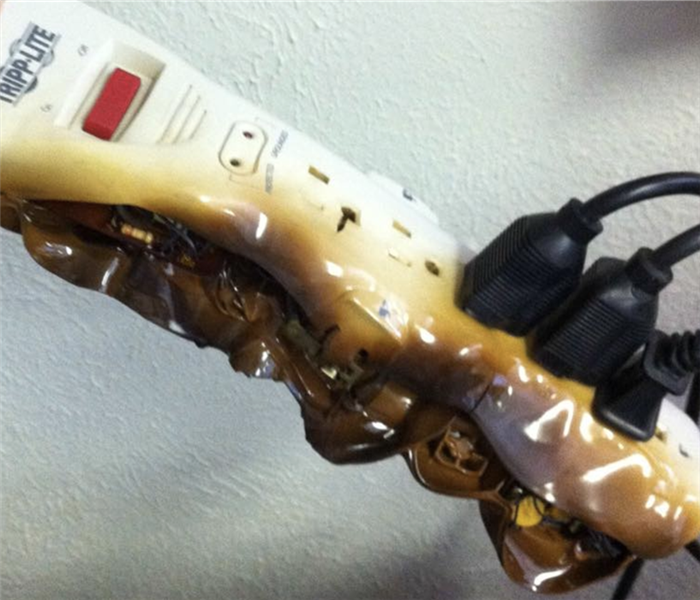 The power strip shorted and caught on fire after a space heater was plugged into it
The power strip shorted and caught on fire after a space heater was plugged into it
Jack Frost and his gang always hit the hardest at the beginning of the year, in peak winter months. This leads us to jack up the heater in efforts to counteract the wicked lows of the winter. Because of this extra effort to combat the cold, there is a statistical rise in house fires during this time of year. Worry not however, SERVPRO is here for a pro tip.
One of the most common causes of house fires come from the misuse of space heaters and power strips. A power strip does not have the capacity to power up a space heater without shorting the strip and potentially causing sparks, leading to a fire.
If you don't have central air and heat and have to use space heaters, make sure that you're using them properly in order to avoid catastrophe. Space heaters can provide a wealth of heat and warmth for a room and its inhabitants if used properly and carefully.
What are Puff Backs and What you need to know.
9/10/2018 (Permalink)
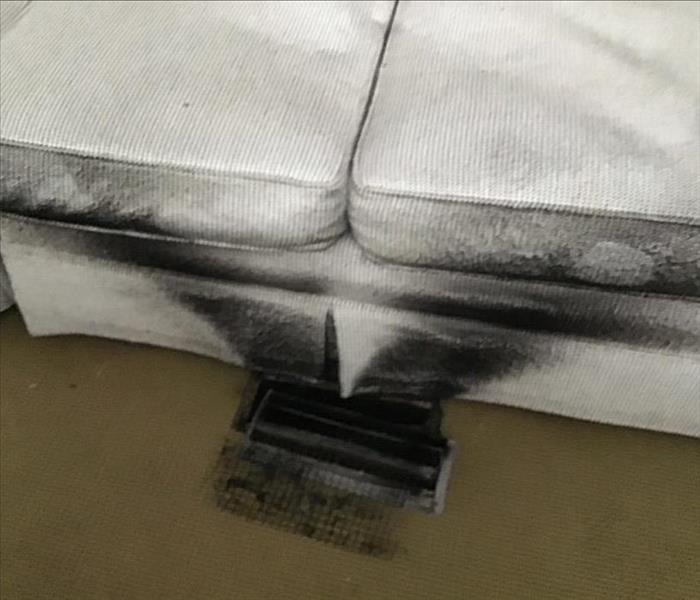 A White Sofa With Heavy Soot Damage as a Result of a Puffback.
A White Sofa With Heavy Soot Damage as a Result of a Puffback.
Our Furnaces work hard during these colder months to keep us warm around the clock. Now even tho Spring is right around the corner, Most of our furnaces still have a bit to go before their ready to take their Summertime break. Like most things, while they do enhance our lives, they could run into problems. Puff Backs are the misfiring in an oil and gas furnace and boilers that sends soot and smoke throughout the structure as well as creating soot webs. Some of the causes of a Puff Back include;
- Clogged Burner, Exhaust, or Chimney
- Damaged Fuel Nozzle
- Cracked Heat Exchange
- Manually Resetting the System too Often. NOTE: *DO NOT press the reset button on your furnace more than ONCE if it pops out. Readily pressing the rest increases your risk of a Puff Back occurring
What do you do if a Puff Back Happens to you? They are not only messy but can become stressful as well. SERVPRO is here to wipe away your stress as well as all the soot.
- Call your Insurance Company
- Call a HVAC repair man to schedule repairs on your furnace or boiler
- Call a cleaning service to clean the soot
- *AVOID trying to clean/wipe any walls, ceilings, painted surfaces, upholstery, or electronics. Cleaning without the proper chemicals could cause damage
- *LIMIT movement to prevent spreading the spread of soot
- *DON’T consume any opened food or drinks due to the possibility of contamination.
- Don’t worry, Professionals are here to help you through this. Don’t be afraid to ask questions or voice any concerns. A Company like SERVPRO is here to make it “Like it never even happened.”
Tips For Surviving a House Fire
9/7/2018 (Permalink)
Ten Essential Tips For Surviving a House Fire
In a normal survival situation, fire is something you need for lings like light, heat, protection, and the ability to cook food. But in the event of a house fire, it can become your biggest enemy and something you need to escape from immediately. Many people have tragically perished in house fires, and if you don't want the same thing to happen to you or your family, you should take these ten essential tips very seriously.
- Write down an escape plan.
- Place Rope Ladders on the upper floors.
- Install and test Smoke Alarms.
- Invest in a Fire Extinguisher.
- Test doors for heat.
- Stay low to the ground.
- Keep your mouth and nose covered with a wet rag or shirt.
- Don't go back in after you have evacuated.
- Have Emergency Kits near the Exits.
- Practice - Do Fire Drills with the family.
Fire - Safety Behaviors
9/7/2018 (Permalink)
Practice Safe Behaviors
To prevent our house from catching fire in the first place, there are some safety precautions that you should take.
- Teach your children fire is a tool, not a toy.
- Always be in the kitchen when you're cooking something. Don't leave cooking food unattended.
- Do not smoke in the house. Make sure you put out your cigarettes completely.
- Dispose of any electronics with frayed wires, which could lead to a fire.
- Avoid lighting candles unless they're directly in your light of vision. Do not leave a lighted candle in a room where no one is.
- Always check that you have turned the gas off before leaving the kitchen.
- Try to use a lighter instead of matches.
- Have a Fire Extinguisher and make sure everyone knows how to use it, in case of an emergency.
Smoke damage due to a fire.
8/27/2018 (Permalink)
When you have a fire inside of your home or business, you may end up having smoke / soot damage. The longer the smoke / soot lingers in your home or business the harder it is to remove and the more it will soak into furniture, curtains , wood and carpets. The faster you contact a SERVPRO Franchise Professional, the quicker we can get to you to determine what kind of smoke damage you have due to the fire. Determining what kind of fire you had, helps to determine the proper restoration method. Different types of fires need different types of clean - up methods.
If you have had a fire or know someone who has had a fire, please call SERVPRO 724-628-3022.
"Like it never even happened."
Fayette County Smoke and Soot Cleanup
12/8/2016 (Permalink)
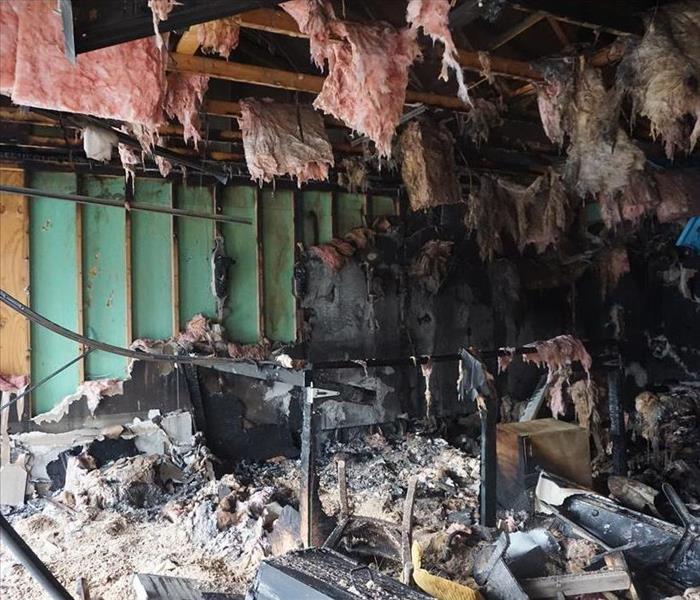 Smoke and Soot Damage Can Cause a Pervasive Odor in Your Fayette County Home.
Smoke and Soot Damage Can Cause a Pervasive Odor in Your Fayette County Home.
Smoke and soot is very invasive and can penetrate various cavities within your home, causing hidden damage and odor. Our smoke damage expertise and experience allows us to inspect and accurately assess the extent of the damage to develop a comprehensive plan of action.
Smoke and soot facts:
- Hot smoke migrates to cooler areas and upper levels of a structure.
- Smoke flows around plumbing systems, seeping through the holes used by pipes to go from floor to floor.
- The type of smoke may greatly affect the restoration process.
Different Types of Smoke
There are two different types of smoke–wet and dry. As a result, there are different types of soot residue after a fire. Before restoration begins, SERVPRO of Fayette County will test the soot to determine which type of smoke damage occurred. The cleaning procedures will then be based on the information identified during pretesting. Here is some additional information:
Wet Smoke – Plastic and Rubber
- Low heat, smoldering, pungent odor, sticky, smeary. Smoke webs are more difficult to clean.
Dry Smoke – Paper and Wood
- Fast burning, high temperatures, heat rises therefore smoke rises.
Protein Fire Residue – Produced by evaporation of material rather than from a fire
- Virtually invisible, discolors paints and varnishes, extreme pungent odor.
Our Fire Damage Restoration Services
Since each smoke and fire damage situation is a little different, each one requires a unique solution tailored for the specific conditions. We have the equipment, expertise, and experience to restore your fire and smoke damage. We will also treat your family with empathy and respect and your property with care.
Have Questions about Fire, Smoke, or Soot Damage?
Call Us Today – (724) 938-3022





 24/7 Emergency Service
24/7 Emergency Service













